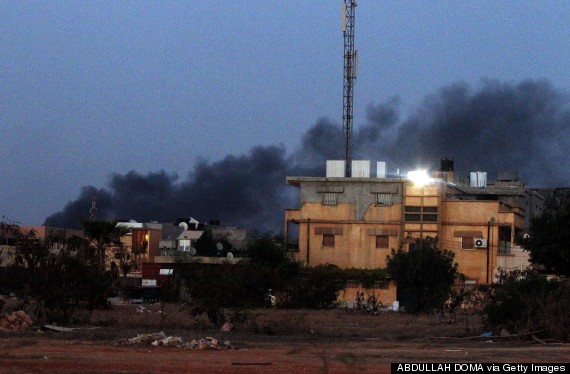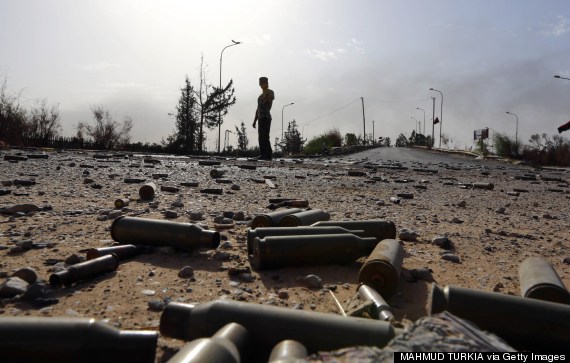Libya's Democratic Transition....
"...Yet activists tell us that dozens of homes have been damaged by rocket attacks, mortar shelling and anti-aircraft weapons."
"It is extremely hard to establish which side is causing damage because the shelling is reckless."
Magdalena Mughrabi, researcher, Amnesty International
Outside interference in Libya exacerbates current divisions and undermines Libya's democratic transition. [Libya was in a] very fragile place."
Jen Psaki, spokeswoman U.S. State Department
"[Reports of an Egyptian role are] unsubstantiated rumours. We have no direct connection to any of the military operations on the ground in Libya."
Egyptian Foreign Minister Sameh Shukri

Gangs of armed men went on a rampage, burning and destroying the homes of government supporters, levelling entire neighbourhoods in Tripoli. Libya's airport and seaport are now closed, destroyed, leaving a shortage of fuel and food. And thousands of Libyans have fled their homes in a search for safety. Between five thousand to six thousand Libyans were reported to have crossed into neighbouring Tunisia daily, leaving authorities in Tunisia to close the border.
The danger level is intense enough to persuade some international aid groups to recall their employees, while many countries have chosen to close their embassies and consulates because of the violence.
For months Egypt, the United Arab Emirates and Saudi Arabia, the Middle East's strongest Sunni Muslim nations have looked on in dismay as Libya falls apart -- a weak government with no military of its own, but using militias they pay to act on their behalf -- tremulously attempts to portray themselves in control, even though violence forced them to move parliament from Tripoli to another city where they are felt to be safer.
This violence began in the wake of Libya's June parliamentary elections when the Islamist-dominated parliament lost to liberal and federalist candidates. As in Egypt, with the unseating of the Muslim Brotherhood and the Brotherhood elite and its followers' refusal to accept their loss of power, the Islamists and their backers would not recognize the newly elected body forcing the new MPs to move from the capital to establish parliament in the eastern city of Tobruk.
Now the Islamists have resurrected the old parliament in Tripoli as it was before elections took place and they have as well installed their own prime minister, gifting a country at war with itself with two prime ministers and two parliaments.
Powerful militias have seized the initiative in this power vacuum leaving the central government incapable of creating a police force or unified military. But Islamist forces have now had to contend with a counter-offensive after losing their place in parliament, led by former Gadhafi-era officer, now rebel, General Khalifa Hifter.
Who has the support of Egypt, Saudi Arabia and the UAE, but not Washington which has more or less washed its hands of interference in Libyan affairs, just as the current American administration is rarely seen on the international stage where eruptions of chaos and madness reign.

Britain, France, Germany and Italy echoed the concerns for non-involvement of the United States, but in fact, this is not their geography and it is time enough that the powerful, populous and wealthy countries of the Middle East exert their influence and their up-to-date military to hold back fanatical Islamists with their jihadist campaigns. According to several Egyptian officials, Egypt has been involving itself closely in Libya's power contest for months.
Egyptian intelligence garnered data on training camps, hideouts and barracks for extremist groups in the east like Ansar al-Shariah, blamed by the United States for the 2012 attack on its Benghazi mission and the murders of four American diplomatic personnel. The Egyptian intelligence operation was complete with an Egyptian elite force named "Rapid Intervention" formed by President Abdel al-Sissi to counter terrorism within and outside of his country.
Seeing it in Egypt's interest to work with Saudi, UAE and Libyan military officials in support of Gen. Hifter's counteroffensive.
Labels: Conflict, Egypt, Islamists, Libya, Saudi Arabia, UAE, United States

<< Home